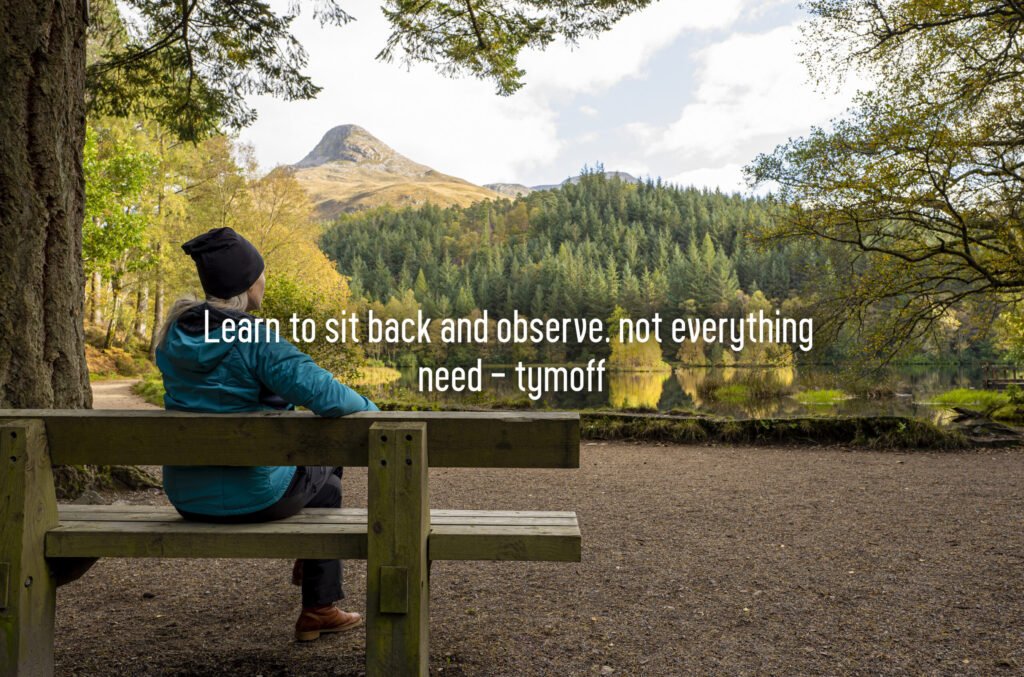Learn to Sit Back and Observe: Not Everything Needs a Timed Response
In today’s fast-paced world, where instant communication and immediate action have become the norm, the art of pausing and observing often gets overshadowed. Whether it’s in personal relationships, professional settings, or daily decision-making, there’s a growing tendency to react swiftly and assertively. However, learning to sit back and observe, rather than rushing to respond, can offer numerous benefits. This article explores why not everything requires an immediate reaction and how mastering the art of observation can enhance various aspects of your life.
The Value of Observation
Understanding the Concept of Observation
Observation is more than just looking or watching; it’s about perceiving and analyzing with a mindful approach. When you sit back and observe, you take a step away from immediate reactions and allow yourself to gather a more comprehensive understanding of the situation. This process involves:
- Active Listening: Paying attention to what is said and how it is said.
- Emotional Awareness: Recognizing the emotional undercurrents in a situation.
- Analytical Thinking: Assessing the context and implications before responding.
The Power of Pausing
In a world that values speed and efficiency, pausing can feel counterintuitive. However, taking a moment to pause before reacting can lead to more thoughtful and effective outcomes. Here’s why:
- Avoiding Impulsivity: Instant reactions are often driven by emotion rather than reason. By pausing, you give yourself a chance to process your feelings and responses more logically.
- Reducing Conflict: Immediate reactions can escalate conflicts, whereas a measured response can lead to resolution and understanding.
- Improving Decision-Making: A pause allows you to weigh options and consider long-term consequences, leading to better decision-making.
Applying Observation in Different Areas of Life
Personal Relationships
In personal relationships, whether with family, friends, or partners, the ability to observe rather than react can significantly enhance communication and harmony.
- Listening More, Reacting Less: By observing how others communicate and express their feelings, you can respond in a way that is more empathetic and supportive. This approach fosters deeper connections and understanding.
- Managing Conflicts: When disagreements arise, taking a step back to observe the underlying issues can help address the root causes of conflict rather than just the surface-level problems.
- Enhancing Emotional Intelligence: Observing emotional cues and body language can improve your ability to empathize and respond appropriately to the needs and feelings of others.
Professional Settings
In the workplace, the ability to observe before reacting can lead to more effective collaboration and problem-solving.
- Strategic Thinking: Observing workplace dynamics and understanding team members’ perspectives can help you make more strategic decisions and contributions.
- Enhancing Leadership Skills: Good leaders observe their teams to understand their strengths, weaknesses, and dynamics. This insight helps in providing appropriate guidance and support.
- Navigating Office Politics: By observing the interplay of personalities and motivations, you can navigate office politics more effectively and build positive relationships with colleagues.
Daily Decision-Making

Whether it’s making choices about your health, finances, or personal goals, taking time to observe can lead to better decisions.
- Informed Choices: Observing trends, patterns, and potential outcomes allows you to make informed choices rather than impulsive decisions.
- Risk Management: By taking a step back, you can evaluate potential risks and rewards more thoroughly, leading to more balanced and calculated decisions.
- Long-Term Planning: Observing the long-term effects of decisions helps in setting realistic and achievable goals, leading to sustained success and fulfillment.
Techniques for Cultivating Observation Skills
Mindfulness Practices
Mindfulness involves being present and fully engaged with the current moment. Practicing mindfulness can enhance your observation skills by:
- Focusing Attention: Mindfulness helps you concentrate on the present, making it easier to notice subtle details and nuances.
- Reducing Stress: A mindful approach reduces the stress and anxiety that often drive impulsive reactions.
- Enhancing Self-Awareness: By being aware of your own thoughts and feelings, you can better understand how they influence your reactions.
Active Listening Techniques
Active listening involves fully concentrating on what is being communicated, rather than just passively hearing the words. Techniques include:
- Reflective Listening: Paraphrasing or summarizing what the other person has said to ensure understanding.
- Non-Verbal Cues: Paying attention to body language, tone of voice, and facial expressions.
- Open-Ended Questions: Asking questions that encourage further discussion and exploration of the topic.
Journaling and Reflection
Keeping a journal allows you to reflect on your experiences and reactions. This practice can help you:
- Identify Patterns: Recognize recurring themes or patterns in your reactions and decisions.
- Gain Perspective: Reflect on your experiences to gain insights into how you can approach similar situations in the future.
- Set Goals: Use your reflections to set personal goals for improving your observation and response skills.
The Role of Technology
In the digital age, technology can both support and hinder your ability to observe and reflect. To leverage technology effectively:
- Use Apps Mindfully: There are mindfulness and journaling apps that can help you develop observation skills. Choose tools that support your goals without overwhelming you.
- Limit Multitasking: Multitasking can reduce your ability to observe and process information effectively. Focus on one task or interaction at a time.
- Embrace Digital Detox: Taking breaks from screens and social media can help you reconnect with the present moment and enhance your observational skills.
Conclusion
In a world that often values speed over thoughtfulness, learning to sit back and observe can be a transformative practice. By embracing the art of observation, you can improve your personal relationships, enhance your professional skills, and make better daily decisions. This approach not only fosters deeper connections and understanding but also leads to more thoughtful and effective responses.
The next time you find yourself on the verge of an immediate reaction, consider taking a moment to pause and observe. This simple yet powerful practice can open up new possibilities for growth, insight, and success in all areas of your life. Embrace the art of observation and watch as it transforms your interactions, decisions, and overall well-being.

